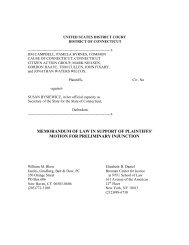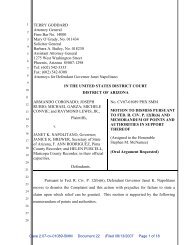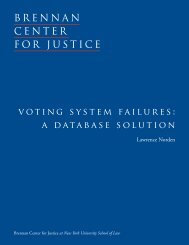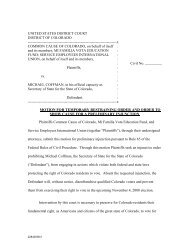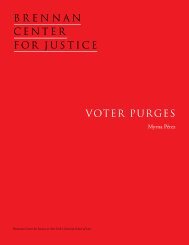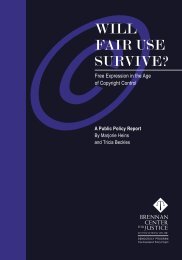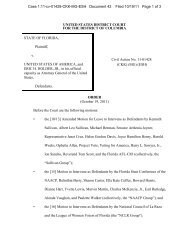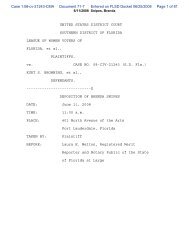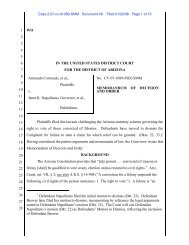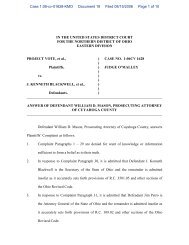immigrants & pleas in problem-solving courts - Brennan Center for ...
immigrants & pleas in problem-solving courts - Brennan Center for ...
immigrants & pleas in problem-solving courts - Brennan Center for ...
You also want an ePaper? Increase the reach of your titles
YUMPU automatically turns print PDFs into web optimized ePapers that Google loves.
IMMIGRANTS & PLEAS IN PROBLEM-SOLVING COURTS:<br />
A GUIDE FOR NONCITIZEN DEFENDANTS & THEIR ADVOCATES<br />
Prepared by the New York State Defenders Association Immigrant Defense Project<br />
Last Updated August 2007<br />
This guide is <strong>for</strong> <strong>in</strong><strong>for</strong>mation purposes only and is not a substitute <strong>for</strong> legal advice.<br />
The <strong>in</strong><strong>for</strong>mation here may no longer be up-to-date.<br />
You should talk to a qualified immigration expert be<strong>for</strong>e agree<strong>in</strong>g to enter any plea or program.<br />
Problem-solv<strong>in</strong>g <strong>courts</strong> can give some defendants a chance to participate <strong>in</strong> rehabilitation<br />
programs and rejo<strong>in</strong> their communities rather than face time <strong>in</strong> jail or prison.<br />
However, if you are a noncitizen, you might face deportation or other negative immigration<br />
consequences if you participate <strong>in</strong> certa<strong>in</strong> <strong>problem</strong>-solv<strong>in</strong>g court programs. This guide expla<strong>in</strong>s<br />
why you are at risk, and what you and your attorney or reentry service provider can do to help<br />
you avoid these risks when work<strong>in</strong>g with <strong>problem</strong>-solv<strong>in</strong>g <strong>courts</strong>.<br />
What are <strong>problem</strong>-solv<strong>in</strong>g <strong>courts</strong> and how do they work<br />
“Problem-solv<strong>in</strong>g <strong>courts</strong>” are <strong>courts</strong> that focus on treatment and rehabilitation rather than long<br />
prison sentences. Examples of “<strong>problem</strong>-solv<strong>in</strong>g <strong>courts</strong>” are drug <strong>courts</strong>, domestic violence<br />
<strong>courts</strong>, mental health <strong>courts</strong>, and community <strong>courts</strong>.<br />
Defendants who participate <strong>in</strong> these special <strong>courts</strong> are often required to plead guilty to the<br />
crim<strong>in</strong>al charges aga<strong>in</strong>st them and/or admit to committ<strong>in</strong>g a crime. Instead of be<strong>in</strong>g immediately<br />
sentenced to prison, however, the defendant is ordered to attend a program (<strong>for</strong> example, drug<br />
treatment or anger management/batterer classes). The court carefully monitors the defendant’s<br />
progress. In some <strong>courts</strong>, if the defendant completes the program successfully, the crim<strong>in</strong>al<br />
charges are reduced or even dropped. In other <strong>courts</strong>, the defendant may end up with a low-level<br />
crim<strong>in</strong>al conviction or non-crim<strong>in</strong>al violation or regulatory offense.<br />
If my charges are dismissed or if I only end up with a non-crim<strong>in</strong>al violation or offense,<br />
why would participation <strong>in</strong> a <strong>problem</strong>-solv<strong>in</strong>g court lead to deportation or other negative<br />
consequences <strong>for</strong> me<br />
The def<strong>in</strong>ition of “conviction” <strong>in</strong> immigration is law is broader than the def<strong>in</strong>ition of<br />
“conviction” <strong>in</strong> crim<strong>in</strong>al law. Immigration law def<strong>in</strong>es a conviction as:<br />
“A <strong>for</strong>mal judgment of guilt of the alien entered by a court or, if adjudication of guilt has<br />
been withheld, where:<br />
(i) a judge or jury has found the alien guilty or the alien has entered a plea of<br />
guilty or nolo contendere or has admitted sufficient facts to warrant a f<strong>in</strong>d<strong>in</strong>g of<br />
guilt, AND<br />
(ii) the judge has ordered some <strong>for</strong>m of punishment, penalty, or restra<strong>in</strong>t on the<br />
alien’s liberty to be imposed.”<br />
1
This def<strong>in</strong>ition of “conviction” <strong>for</strong> immigration purposes can cover some charges or offenses that<br />
are not even considered “crimes” <strong>in</strong> crim<strong>in</strong>al law. Furthermore, even if your charges are dropped<br />
because you successfully participated <strong>in</strong> a program, immigration law might still treat the<br />
comb<strong>in</strong>ation of your plea <strong>in</strong> court and the court order requir<strong>in</strong>g you to attend a program as a<br />
“conviction” <strong>for</strong> immigration purposes. That “conviction” might make you deportable or unable<br />
to get permanent resident status or citizenship.<br />
Be<strong>for</strong>e you plead guilty to anyth<strong>in</strong>g, you should check with an immigration attorney to f<strong>in</strong>d out if<br />
there are immigration consequences to your plea. If you already pled guilty to someth<strong>in</strong>g, check<br />
with an immigration attorney to f<strong>in</strong>d out whether you are deportable and if you might have a way<br />
to fight deportation.<br />
What if I didn’t have to plead guilty or admit any guilt to a crime<br />
If you are told that you do not have to plead guilty or admit guilt to any crime, then you probably<br />
will not have a “conviction” <strong>for</strong> immigration purposes. An Adjournment <strong>in</strong> Contemplation of<br />
Dismissal (ACD) <strong>in</strong> New York law is an example of the k<strong>in</strong>d of result that will not lead to<br />
deportability. However, you should be careful about what you do be<strong>for</strong>e your case is actually<br />
dismissed.<br />
Even if you are not deportable, any <strong>in</strong>teraction with the crim<strong>in</strong>al justice system, even an arrest or<br />
case not yet dismissed, can give the Department of Homeland Security a reason to scrut<strong>in</strong>ize<br />
your application <strong>for</strong> permanent residence or citizenship more closely, or cause <strong>problem</strong>s when<br />
you are try<strong>in</strong>g to travel to and from the United States. Always talk to an immigration attorney to<br />
be sure about what to expect, and if possible, avoid travel<strong>in</strong>g or submitt<strong>in</strong>g applications to the<br />
Department of Homeland Security until your case is actually dismissed.<br />
What if I have old convictions<br />
Any old convictions might get you <strong>in</strong>to trouble, even if your current court case results <strong>in</strong> an<br />
outright dismissal or an Adjournment <strong>in</strong> Contemplation of Dismissal (ACD). Immigration law<br />
has changed <strong>in</strong> recent years, and some old convictions are now deportable offenses even though<br />
they were not deportable offenses <strong>in</strong> the past. You should talk to an immigration attorney to f<strong>in</strong>d<br />
out what risks you face now.<br />
How can I, or my attorney, f<strong>in</strong>d out whether my case <strong>in</strong> <strong>problem</strong>-solv<strong>in</strong>g court or old<br />
convictions will cause immigration <strong>problem</strong>s<br />
You or your lawyer should speak to an experienced immigration attorney to f<strong>in</strong>d out whether<br />
what’s happen<strong>in</strong>g <strong>in</strong> court (the plea offer, an agreement to attend a program, etc.), or old<br />
convictions you already have, will result <strong>in</strong> immigration <strong>problem</strong>s. As expla<strong>in</strong>ed above, even<br />
<strong>pleas</strong> to some misdemeanors and non-crim<strong>in</strong>al violations might result <strong>in</strong> deportation or other<br />
immigration <strong>problem</strong>s. Your risk of be<strong>in</strong>g deported might also depend on your immigration<br />
status (whether you are a greencard/permanent resident card holder, a refugee/asylee, or<br />
undocumented), your crim<strong>in</strong>al record (even if your convictions are very old), how many years<br />
2
you had been liv<strong>in</strong>g <strong>in</strong> the United States be<strong>for</strong>e committ<strong>in</strong>g any crimes and/or whether you have<br />
relatives <strong>in</strong> the United States.<br />
You or your advocate can get free advice from the NYSDA Immigrant Defense Project, (212)<br />
725-6422. For more written <strong>in</strong><strong>for</strong>mation, <strong>pleas</strong>e see “Understand<strong>in</strong>g the Immigration<br />
Consequences of Your Crim<strong>in</strong>al Charges” by the NYSDA Immigrant Defense Project.<br />
When might the government start deportation proceed<strong>in</strong>gs aga<strong>in</strong>st me if I’ve already pled<br />
guilty to a deportable offense <strong>in</strong> a <strong>problem</strong>-solv<strong>in</strong>g court or have an old conviction that<br />
makes me deportable<br />
Even if your case is go<strong>in</strong>g to be dismissed and sealed, you may still be at risk <strong>for</strong> deportation if<br />
you pled guilty or admitted that you committed a crime <strong>in</strong> court and then are ordered <strong>in</strong>to a<br />
program, or have an old conviction that makes you deportable. The government might f<strong>in</strong>d out<br />
about the current plea/admissions of guilt or the old conviction <strong>in</strong> the follow<strong>in</strong>g circumstances:<br />
(1) When you are <strong>in</strong> jail or prison, even if only <strong>for</strong> a short period of time (<strong>in</strong>clud<strong>in</strong>g if you are<br />
imprisoned <strong>for</strong> a few days as a “sanction” <strong>for</strong> failure to comply with the rules of your<br />
treatment program)<br />
(2) If you are return<strong>in</strong>g to the United States from an <strong>in</strong>ternational trip<br />
(3) If you apply <strong>for</strong> a lawful permanent resident card (greencard) or citizenship<br />
(4) If you renew your greencard<br />
(5) If you have other <strong>in</strong>teractions with government officials (<strong>in</strong>clud<strong>in</strong>g police, border agents,<br />
and others)<br />
If you do not follow the rules of your court-ordered program, the court might send you to jail <strong>for</strong><br />
a few days (this is a common sanction <strong>in</strong> drug treatment <strong>courts</strong>, <strong>for</strong> example). Many jails permit<br />
immigration officials to <strong>in</strong>terview people be<strong>in</strong>g held there. You should not answer any questions<br />
without your lawyer present, but you can avoid this situation altogether if you comply with the<br />
rules of your court-ordered program, so that you are not sent back to jail or prison. Also, be<strong>for</strong>e<br />
you decide to travel outside the U.S. or submit any immigration/citizenship applications to the<br />
government, you should consult with an immigration attorney to f<strong>in</strong>d out if you could face<br />
deportation or other negative immigration consequences.<br />
What are some examples of how noncitizen defendants have been placed <strong>in</strong> deportation<br />
proceed<strong>in</strong>gs follow<strong>in</strong>g participation <strong>in</strong> <strong>problem</strong>-solv<strong>in</strong>g <strong>courts</strong><br />
Consider these examples, taken from New York State law:<br />
Example 1: Jane is a lawful permanent resident (i.e., a green card holder) and has been<br />
charged with Crim<strong>in</strong>al Possession of a Controlled Substance <strong>in</strong> the 5 th degree, a class D<br />
felony (NYPL 220.06). She pleads guilty to this charge as part of a drug court program and<br />
is ordered <strong>in</strong>to drug treatment. Upon her successful completion of the program requirements,<br />
the charges are dismissed. She believes that she does not have a conviction on her crim<strong>in</strong>al<br />
record. A year later, Jane applies <strong>for</strong> citizenship. The application <strong>for</strong>m <strong>in</strong>structs her to<br />
disclose if she has ever been placed <strong>in</strong> a rehabilitative or diversion program. She expla<strong>in</strong>s the<br />
3
drug treatment order. The Department of Homeland Security <strong>in</strong>itiates removal proceed<strong>in</strong>gs<br />
aga<strong>in</strong>st her, say<strong>in</strong>g she can be deported because of her conviction.<br />
Example 2: John is a noncitizen and does not have legal status. He has been married to a<br />
United States citizen <strong>for</strong> five years. John has been charged with Aggravated Harassment, 2 nd<br />
degree, a Class A misdemeanor. He pleads down to Harassment <strong>in</strong> the 2 nd degree (Penal Law<br />
240.26), a violation. It is his second such conviction. He is sentenced to a conditional<br />
discharge and a batterer program. He completes the program successfully and receives a<br />
discharge. A few months later, his wife sponsors his adjustment of status application so that<br />
he can receive lawful permanent resident status (a green card). He is placed <strong>in</strong> removal<br />
proceed<strong>in</strong>gs, and told that he might be deported on the basis of his status and his convictions.<br />
What options <strong>in</strong> <strong>problem</strong>-solv<strong>in</strong>g court will give me the best chance of rejo<strong>in</strong><strong>in</strong>g my family<br />
and community <strong>in</strong> the U.S. rather than be<strong>in</strong>g deported<br />
Some <strong>problem</strong>-solv<strong>in</strong>g <strong>courts</strong> and prosecutors may be will<strong>in</strong>g to consider certa<strong>in</strong> alternative<br />
arrangements <strong>for</strong> noncitizen defendants who want to preserve their opportunity to rejo<strong>in</strong> their<br />
families and communities. These alternatives help fulfill the objectives of <strong>problem</strong>-solv<strong>in</strong>g<br />
<strong>courts</strong> because they permit the defendant to seek rehabilitation and return to his or her family as<br />
a law-abid<strong>in</strong>g caretaker and wage earner.<br />
You can ask your crim<strong>in</strong>al defense attorney and/or reentry advocate to approach the court with<br />
the follow<strong>in</strong>g alternatives:<br />
1. Ask to enter the program without plead<strong>in</strong>g guilty<br />
Some <strong>courts</strong> will permit defendants to participate <strong>in</strong> court-ordered treatment without plead<strong>in</strong>g<br />
guilty to the <strong>in</strong>itial crim<strong>in</strong>al charges (<strong>for</strong> example, through an Adjournment <strong>in</strong> Contemplation<br />
of a Dismissal (ACD)). Your crim<strong>in</strong>al defense attorney should ask the court to consider that<br />
option <strong>in</strong> your case. If the court seems unwill<strong>in</strong>g to drop the plea requirement, your attorney<br />
can offer someth<strong>in</strong>g else <strong>in</strong>stead of a guilty plea or on-the-record admission. For example,<br />
with the assistance of your attorney, you could sign a contract with the prosecutor <strong>in</strong> which<br />
you agree to give up certa<strong>in</strong> trial rights <strong>in</strong> exchange <strong>for</strong> enter<strong>in</strong>g the court-ordered program<br />
without any admission of guilt.<br />
For examples of the k<strong>in</strong>ds of alternative arrangements that have been successfully used <strong>in</strong><br />
<strong>problem</strong>-solv<strong>in</strong>g <strong>courts</strong>, contact the Immigrant Defense Project at (212) 725-6422.<br />
2. Ask to plead to a different charge<br />
Some <strong>courts</strong> will not be will<strong>in</strong>g to consider lett<strong>in</strong>g you participate <strong>in</strong> the treatment program<br />
without some k<strong>in</strong>d of guilty plea. In that case, you should talk to your crim<strong>in</strong>al defense<br />
attorney about whether another plea might be appropriate given the facts of your case. For<br />
example, while a plea to a drug offense will almost certa<strong>in</strong>ly make you subject to possible<br />
deportation, a plea to another charge <strong>in</strong> your case might leave you <strong>in</strong> a better position to face<br />
4
any future immigration issues (such as a low-level simple trespass or resist<strong>in</strong>g arrest offense,<br />
which might be a safer option <strong>in</strong> some states).<br />
Contact the Immigrant Defense Project at (212) 725-6422 <strong>for</strong> advice about possible<br />
alternative <strong>pleas</strong> <strong>in</strong> your case.<br />
3. Ask to enter the program without a court order requir<strong>in</strong>g your participation<br />
If you are never <strong>for</strong>mally ordered by the court to attend a program as part of your crim<strong>in</strong>al<br />
case, you might be able to argue that you do not have a “conviction” <strong>for</strong> immigration<br />
purposes. Some <strong>courts</strong> may permit you to enter a program voluntarily or through an off-therecord<br />
agreement with the prosecution, and then later will dismiss the charges without hav<strong>in</strong>g<br />
ordered you to do anyth<strong>in</strong>g. Thus, you may be able to argue that there is no court-ordered<br />
“punishment, penalty or restra<strong>in</strong>t on liberty” <strong>in</strong> your case, and thus it is not a “conviction”<br />
under immigration law. However, there has not been much litigation on this issue, so we do<br />
not know if you will be safe from deportation simply by enter<strong>in</strong>g a program on your own or<br />
through an off-the-record agreement. But, if the court is will<strong>in</strong>g to let you enter the program<br />
without a court order and either does not require a plea or allows an alternative plea, you will<br />
be <strong>in</strong> a strong position to argue that you do not have a “conviction” <strong>for</strong> immigration<br />
purposes.<br />
The law on these issues is not fully developed. You should always contact an immigration<br />
attorney <strong>for</strong> advice be<strong>for</strong>e accept<strong>in</strong>g any plea or diversion program. We are available to<br />
help you make these decisions. Contact the Immigrant Defense Project at (212) 725-6422.<br />
5


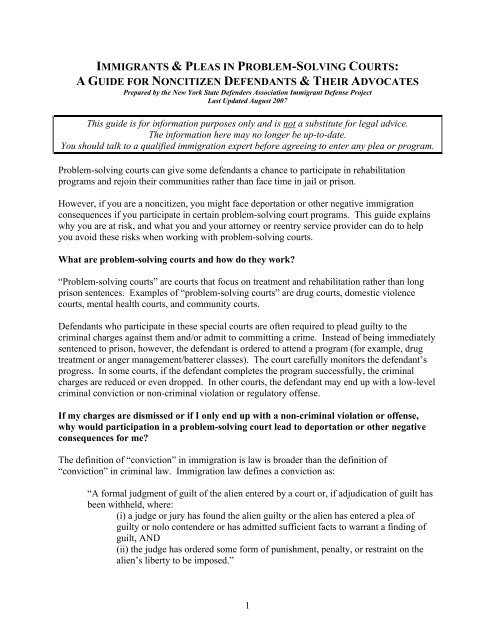

![Download the Letter [PDF] - Brennan Center for Justice](https://img.yumpu.com/50139248/1/190x245/download-the-letter-pdf-brennan-center-for-justice.jpg?quality=85)

